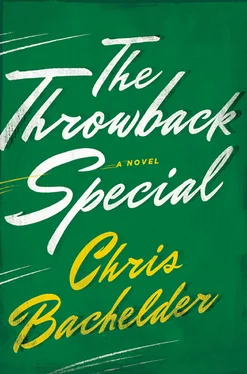Jerry, the transportation director for Prestige Vista Solutions, walked past the men on the couch and wished them good luck this evening. The men nodded, thanked Jerry.
“Big night,” Jerry said.
The men concurred. Myron had a startled expression on his face.
“Last year, right?” Jerry said.
Gil took off his reading glasses, and cleaned them with his shirt. The elevator bell rang twice. Tommy stared down at his hands, folded in his lap. Myron said, “What?”
“This is the last year, right?” Jerry said.
“Who told you that?” Gil said.
“A guy yesterday,” Jerry said. “I don’t know his name. Guy with a chinstrap. Was it some kind of secret?”
The men shook their heads. “No,” Myron said. “Of course not.”
“Take it easy,” Jerry said, walking toward the automatic doors of the lobby. “Have fun.”
The fountain gurgled. The desk clerk read Dune . The bright, enormous clock bathed the entire lobby in time. Each of the three men on the couch assumed that the other two men had known, that he was the only one who had not. Each felt the sting of exclusion, the ancient wound, before anger rushed in like an antibody. Why had he not been told? Why had he been treated like a child? They sat in silence, staring up at the television, the muted anchors. Each man was indignant. Beneath the indignation there was an exotic and diverse world of feeling, as dark as an ocean trench.
BY CUSTOM the men ate dinner with positional mates. By custom they made their way in clusters down the dirt path along the service road, ducking under the heavy wet branches of evergreens. By custom they ate inexpensive food with sauce packets. By custom they ate in silence. There was, after all, no reason to say that Theismann’s right leg remains to this day shorter than his left, or that the sound by his own account was like two muzzled gunshots or that the surgeons at Arlington Hospital had to wash the wound dozens of times with saline solution in an attempt to prevent infection. (“You start with a gallon,” one of the surgeons said, and the men did not.) There was no need to say that Theismann described the injury as a kind of death, followed by rebirth. Straws squeaked inside the lids of fountain drinks. Boys within the plastic tunnels of the restaurant’s Play Zone taunted other boys, and then injured themselves attempting to flee. By tradition the man playing Theismann and the man playing Taylor stayed away from each other, like a bride and groom before a wedding. Nobody ate all that much.
Back in their rooms, the men helped each other pull jerseys over shoulder pads. They helped each other tape fingers and wrists, tie shoelaces. By tradition, each man would drive to Warren G. Harding Middle School alone. Nobody would carpool. They left the hotel in full uniform, carrying their wallets and keys inside their helmets. That sound, vaguely martial, was their cleats across the parking lot.
“WAIT, DO YOU EVEN KNOW WHERE IT IS?”
“It’s supposed to be over here.”
“Is it a stadium?”
“No, it’s a field at a middle school. We’re close.”
“A football field?”
“Yes.”
“Middle schools have football fields?”
“What are you talking about?”
“Why would a middle school need a football field?”
“Where are you from?”
“New Hampshire.”
“There are lights over there.”
“Where?”
“See the lights?”
Brandon turned left at a stoplight, and drove his Toyota through the wet streets toward the distant yellow glow of a light tower. Sarah sat in the passenger seat beside Brandon, smoothing the suitcase folds out of her jeans. Paul and Deirdre sat in the back with not enough leg room. They were all young sale associates for Prestige Vista Solutions, two or three years out of college. After a day in the conference room, they felt like falsely convicted inmates exonerated by DNA evidence. The interior of the sedan was humid with fertility and body spray. The seat belts seemed like a form of sexual restraint, a precaution. Deirdre put her cheek against the cold glass of the window. At a stoplight a man in an expensive car smiled at her, and waved. She did not smile back or wave, but she received his attention, and kept it.
All of the young sale associates agreed, riding through the night, that the new commissions program would be excellent if they got a lot of sales, less desirable if they did not. They all privately liked Kevin, the team leader, but they laughed about the sweat stains, the pants, the screensaver of the ugly baby and the dog.
“There’s the parking lot,” Paul said.
“Do we need tickets or anything?” Sarah said.
“I doubt it.”
Only the women had umbrellas. They offered to share them, but the men declined. Sarah found a ring of wet keys on the ground next to a car, and she rested them on the handle of the driver’s-side door. Paul cradled a backpack beneath the front of his jacket as they walked toward the field, where football players stretched and jogged and performed jumping jacks beneath rain and low wisps of fog. The grass was patchy and brown, dotted with dark puddles. It was not lined with chalk. A distant goalpost lay on its side in the mud, mired like a mastodon in a tar pit. Two leaning light towers draped a feeble glow onto the field, accentuating the vast darkness beyond. At the far end of the field a scoreboard with missing lights showed seven points for the home team and seven for the visitor, with an indecipherable number of minutes remaining in what appeared to be the second quarter. Above the scoreboard a wooden sign welcomed fans to the Falcons Nest, and beneath it stood a man in a yellow poncho. In the cold rain, alone beneath a dilapidated scoreboard and a grammatical error, the man had the posture of one who was enduring a severe test of faith from a higher power.
Several long wooden benches ran crookedly along one sideline. On the other sideline there was a narrow block of aluminum bleachers, which wobbled and creaked as the young sales associates climbed to the top row. “Luxury box,” Brandon said. Sarah had thought to bring two hotel towels, and she wiped the bench dry. The four sat close together beneath the two feminine umbrellas, their pockets buzzing intermittently with text messages from their boyfriends and girlfriends back home. They were all conscious of attempting to have a memorable night, and of having one.
“When are you due?” Deirdre asked Paul, pointing at the backpack tucked beneath the front of his jacket.
“Any day now,” Paul said, rubbing his belly.
“ Push ,” Deirdre said.
Paul extricated the backpack, and unzipped it. He liked having something to do, and he liked the way Deirdre’s upper arm, beneath her jacket and sweater, felt against his upper arm, beneath his jacket and sweater. “I am the proud mother,” he said, “of a party.” He removed from the backpack four plastic cups and a bottle of sparkling wine that could be, if necessary, a joke. A nice bottle of champagne would have made it look like he was trying too hard, but in fact he had tried very hard to make it look as if he was not trying too hard. It had taken him almost half an hour to find a bottle of sparkling wine that seemed versatile enough to pass for either thoughtful or parodic, and perhaps both. He wanted to let the night decide. Now he draped a folded wet towel over his arm. He was suddenly a maître d’, not a new mother. Deirdre laughed, as did Paul and Sarah. He put the towel over the bottle, and expertly removed the cork from the inexpensive sparkling wine. The happy, expensive sound of it. When he poured, he tilted the cups at forty-five-degree angles to minimize the loss of bubbles. He had worked for a catering company in college. As he poured, he glanced at Sarah’s face, trying to determine the meaning of his own gift. Drops of rain slid from the edge of the umbrella into the cups of sparkling wine. Paul wanted to say something in French, but he had forgotten all of it. There was also in the backpack a box of cookies, a festive assortment. The women each selected a cookie, and the men took three. They clicked plastic cups, drank to the core values of Prestige Vista Solutions.
Читать дальше












